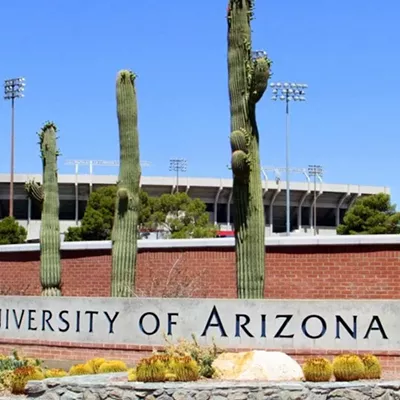In a surprise move, Superintendent Roger Pfeuffer last week announced he was suggesting the TUSD school board throw in the towel on the district's 2006 application for $35 million.
"My recommendation is to take action to say we are terminating our (E-Rate) application process," Pfeuffer told the district's Bond Fiscal Oversight Committee, retreating from his previous position.
The E-Rate program, which makes $2.25 billion available nationwide, is mostly used to reimburse school districts for phone bills. Because of that, awards are usually readily available and typically amount to tens or hundreds of thousands of dollars, but may exceed $1 million in some cases.
A few school districts also receive considerably larger sums of E-Rate funding to help upgrade their technology infrastructure, especially districts with schools including a high percentage of students from poor families. It was this vision Pfeuffer had convinced the majority of the TUSD school board to pursue in February, but that dream has now disappeared for this year.
Even before the board's decision to approve two applications to totally replace the district's existing technology network and make other improvements, TUSD's 2006 E-Rate program was controversial (See "Communication Breakdown," June 8 and "Tech Trials," June 15). To try to clear the air, the elected officials requested the Arizona Attorney General's office look into the process used to select potential commercial vendors for the program.
By the board's June 13 meeting, Pfeuffer was acknowledging TUSD wasn't going to receive anywhere near $35 million in E-Rate funds for 2006. "We should begin to adjust our expectations (for this year)," he said, "and instead focus on the next round" of E-Rate applications in 2007.
In an attempt to overcome TUSD's dismal track record with the program, Pfeuffer proposed using some of the district's $8 million in voter-endorsed technology-bond funds to hire a pricey consultant.
On June 13, under a consent-agenda item--which TUSD school board member Judy Burns demanded be discussed instead of routinely rubber-stamped--Pfeuffer recommended hiring Miller Institute of Learning with Technology. This San Carlos, Calif., consulting firm would operate the district's E-Rate process and be paid in excess of $1 million during a three-year period.
Pfeuffer insisted the district needed someone like the company. "Any organization our size uses a consultant," he told the board. "We need this type of consulting service."
Firing back, Burns was blistering in her criticism of Pfeuffer and his staff. "We don't need an outside group to do this," Burns declared, "if one staff member is designated (to prepare the E-Rate application)."
In rebuttal, an obviously flustered Pfeuffer replied: "I'm bothered by the idea that there is a conspiracy to head the district in the wrong (technology) direction."
Burns also blasted Pfeuffer for not taking his proposal first to the district's bond committee, a citizens' group which reviews expenditures from the 2004 package. In an explanation, Pfeuffer acknowledged it was a mistake not to have done so, and conceded he hadn't realized bond money was going to be used to pay the consultant.
After the school board referred the issue to the committee, on June 22, Pfeuffer met with them. Citing supposedly new information which shows 34 TUSD schools with close proximity to existing technology fiber cables--not the 10 previously thought--Pfeuffer came up with his third plan this year for improving the district's communication network.
Instead of hiring the consultant, he told the group he wants to use bond funds to employ three or four new staff members to run the district's E-Rate process. He said some minor and temporary consulting services would also be needed, bringing the total cost to no more than $200,000 annually.
The committee backed this latest proposal, and it was on the agenda for consideration at the school board's Tuesday, June 27 meeting (which fell after the Weekly's publication deadline).
Assuming the board goes along with Pfeuffer's suggestion to pull the plug on this year's E-Rate applications, all the district will have to show for the 2006 fiasco is the ongoing investigation by the attorney general.
Prior to the Tuesday school board meeting, Burns was elated over Pfeuffer's decision to drop the applications. But even though the superintendent's decision to hire in-house staff to run the district's E-Rate program is a complete capitulation to her earlier opinion, Burns was still considering how she would vote on this latest twist from Pfeuffer.
"I'm going to ask some questions before deciding," she said. "I'm still concerned about using bond funds this way."
As for how the district should proceed with addressing its long-term technology problems, the maverick school board member was more certain.
"We should look at what we have now and what we can do with it," Burns said. "We need to build a long-lasting system to meet our needs. We need to increase our bandwidth and provide reliable 911 service and voice mail."
To accomplish those goals, Burns wants to see the district do some planning before spending huge sums of money on infrastructure upgrades.
"We should take it slow and deliberate," she said, "and prepare a technology plan that makes sense instead of this pie-in-the-sky stuff."









